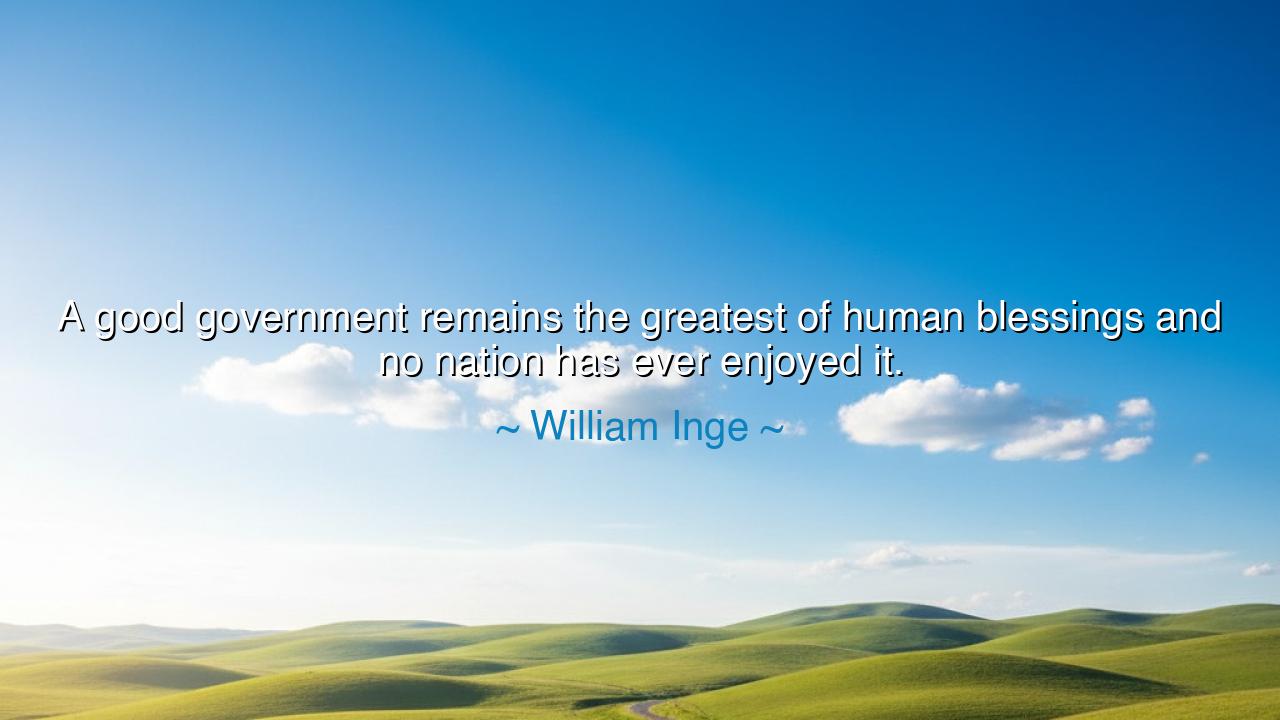
A good government remains the greatest of human blessings and no
A good government remains the greatest of human blessings and no nation has ever enjoyed it.






In a tone both mournful and wise, William Inge, the English philosopher and theologian, once spoke these haunting words: “A good government remains the greatest of human blessings and no nation has ever enjoyed it.” His words fall upon the heart like both a blessing and a curse—for they contain within them the eternal longing of humanity for justice, and the tragic truth that such perfection lies forever beyond our grasp. It is the paradox of civilization itself: that though men build cities, write laws, and crown leaders in the hope of peace and virtue, every system is marred by the very flaws of those who create it. Yet in that struggle, that endless striving for goodness, lies the nobility of mankind.
To grasp the meaning of this quote is to confront the frailty of human nature. A good government, Inge declares, is the greatest of all blessings—greater than wealth, greater than art, greater even than knowledge—for it is the foundation upon which all other blessings rest. Without justice, freedom decays; without order, prosperity collapses. The government is the mirror of the people’s soul, reflecting their wisdom or their folly. But when Inge says that “no nation has ever enjoyed it,” he laments that every attempt to rule justly has been corrupted by greed, ambition, or ignorance. From the pharaohs of Egypt to the democracies of the modern world, humanity has pursued the ideal of perfect governance, only to fall short time and again.
History bears endless witness to this truth. Consider the Roman Republic, born from the dream of shared power and civic virtue. For centuries it endured as a beacon of law and reason, producing senators, soldiers, and philosophers who believed that the Republic itself was sacred. Yet even Rome, mighty and disciplined, could not resist the slow decay of corruption. As power grew, virtue waned. The Senate grew rich while the poor starved; ambition replaced duty; generals like Caesar turned their armies against their own state. Thus the Republic fell, and from its ashes rose the Empire—strong, magnificent, yet ruled by emperors whose whims outweighed justice. The Romans had achieved greatness, but not goodness; glory, but not grace. And so, as Inge said, they never truly “enjoyed” a good government, though they came closer than most.
The origin of Inge’s thought comes not only from his study of history, but from his contemplation of the human soul. He lived through the turbulence of modernity—two world wars, the rise of totalitarianism, and the disillusionment of the modern age. He saw how even the most noble ideals could be twisted by pride, how democracy itself could descend into tyranny of the majority, and how men who promised freedom often brought chains. To Inge, the problem was not the form of government—monarchy, democracy, or republic—but the imperfection of man. For how can a structure built by fallible beings be anything but fallible? Even the finest laws cannot make a people virtuous; even the best rulers cannot rise above the corruption that power brings.
And yet, Inge’s words are not meant to breed despair. They remind us that while perfection may be unattainable, the pursuit of it is essential. Just as a sailor never reaches the horizon yet must always sail toward it, so too must societies strive for a better government, even knowing it will never be flawless. The philosopher understood that it is in the striving that civilization survives. The vigilance of citizens, the courage of reformers, the wisdom of leaders—all are acts of faith against the inevitable decay of power. Each generation inherits the unfinished work of justice and must carry it forward, knowing it will never be complete.
Consider the story of George Washington, who could have made himself a king after leading the American Revolution. The people adored him, and his generals would have crowned him. Yet he chose to step down, surrendering power back to the people. In that act, he gave the world not perfection, but hope—a glimpse of what good government might be: rule by restraint, not domination; by virtue, not vanity. His example did not abolish corruption or guarantee justice forever, but it proved that goodness in leadership is possible, even if fleeting. And such moments, though brief, are the stars by which future generations must navigate.
Thus, my children of the modern age, take this lesson to heart: good government is not a gift, but a labor. It does not descend from heaven; it is forged through vigilance, courage, and sacrifice. Do not despair that perfection is beyond reach—rejoice instead that the pursuit of it ennobles you. Be watchful of your leaders, but also of yourselves, for every government is the shadow of its people’s soul. A corrupt populace will breed corrupt rulers; a virtuous people will lift them higher. The task, therefore, is not to seek a perfect state, but to build a just society, day by day, act by act, conscience by conscience.
And remember always William Inge’s solemn wisdom: that the dream of a perfect government is the dream of humanity itself. It will never be fully achieved, yet it must never be abandoned. For in reaching toward that unreachable ideal, mankind keeps alive the flame of civilization—the light that guides us through the darkness of tyranny, and reminds us that though no nation has ever enjoyed perfect government, every generation holds the power to bring it a little closer.






AAdministratorAdministrator
Welcome, honored guests. Please leave a comment, we will respond soon